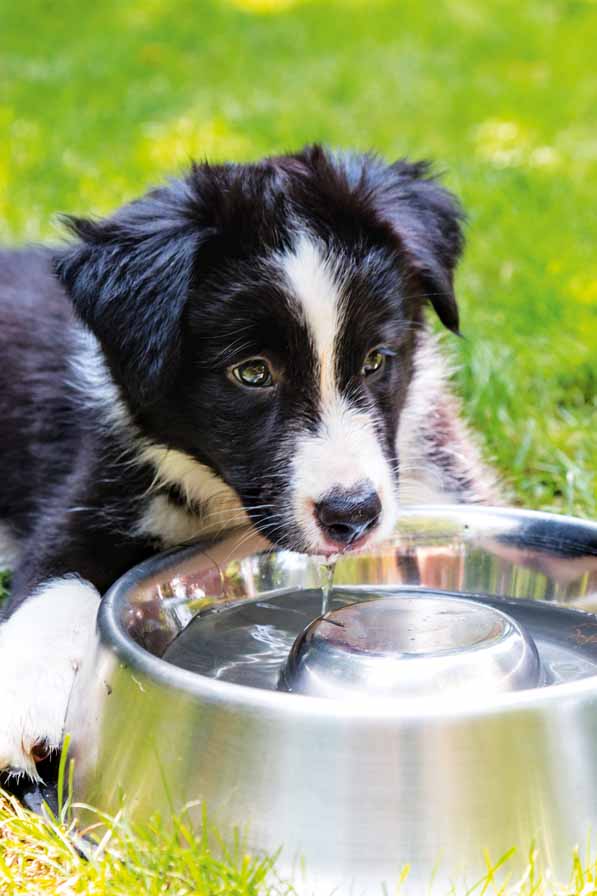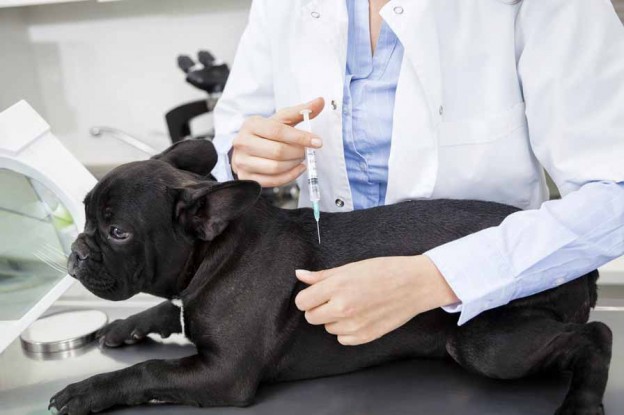Keeping your dog free of worms is an important part of dog ownership. There are, however, many different types of deadly worms in dogs that needs to be protected from, and the choice of treatments is varied. Rachel Belshaw investigates the parasites that can attack your dog and what you can do to prevent infection.
Worms are extremely dangerous to dogs. Undetected, they can damage your dogs internal organs, with serious, if not fatal, outcomes. It is therefore very important that dog owners provide a complete worm protection program for their pooch. With the right information, Dogs Life can help you arm yourself with the knowledge to take on these nasty parasites.
We bring to you a breakdown of the most common worms, with an explanation of how they are contracted, as well as the signs and symptoms that your dog may be infected.
Heartworm (Dirofilaria immitis)
Contracted through mosquito bites, heartworm is most common in tropical and sub-tropical climates. In these conditions, it is typical for the entire dog population to be infected if there isnt any protection. If left untreated, heartworm can cause both heart and lung disease, and an infected dog can die within a few months.
According to veterinarian Dr Cameron Fay, in some cases heartworm is asymptomatic (showing no signs of infection). Otherwise, symptoms of heartworm include coughing, exercise intolerance, breathing difficulty, weight loss, fainting, abdominal fluid formation and coughing up blood, he said.
In the case of heartworm, prevention is far better than cure.
Once a dog has heartworm, treatment depends on severity, but can involve a one- to three-day hospital stay and treatment on consecutive days with a harsh, arsenic-based drug. The treatment is risky and, as the worms die, large fragments can float through the bloodstream and lodge in the tissue. This is called a thromboembolic episode, Fay explained.
Roundworm (Toxocara canis, Toxascaris leonina)
Up to seven inches long, roundworm will consume a dogs nutrients, causing a failure to thrive and, in severe cases, a potbelly and obstruction of the intestine. Discomfort to your pet is likely, with bloating, abdominal pain and intestinal motility problems common. Roundworm can also cause diarrhea and vomiting. However, it is important to note that this type of worm can be present without showing any symptoms.
Seventy-five percent of puppies are thought to have roundworm, with the most common transmission coming from their mothers at birth. Dogs may also become infected through their normal grooming habits. It is important to protect your dog from becoming infected, as the condition is contagious to humans.
Hookworm (Ancylostoma caninum)
An important worm to look out for, hookworm can cause very serious illness to your pet. This worm feeds on the blood in the small intestine. Fay explained that hookworm can migrate to other parts of the body, usually the lungs, where they complete maturation and are coughed up and swallowed, leading back to the intestines.
The most common form of transmission of hookworm is by dogs eating hookworm eggs. However, Fay reveals the worms can also migrate through the skin. Again, this worm can be given to puppies at birth, having been passed on through the placenta of the mother.
Puppies who have a heavy infection of hookworm can become seriously ill. As hookworms suck the blood from the host, anaemia is possible for young dogs. Common symptoms include bloody diarrhoea, weight loss, anaemia and general weakness. Again, this worm is contagious to humans.
Tapeworm (Dipylidium caninum)
There are two types of tapeworm: flea and hydatid. Both live in dogs small intestines and look like grains of rice in faeces or sesame seed-like objects around the anus. This is how many cases of tapeworm have been diagnosed.
Tapeworms can grow to be six inches long or more. Flea tapeworm is the most common and is spread by dogs ingesting fleas that have eaten tapeworm eggs. When dogs ingest the flea, it is digested, leaving the juvenile tapeworm. After three weeks, the worms will grow enough for tapeworm segments to appear in the faeces, Fay said. Control fleas and you’ll most likely control tapeworm.
Hydated tapeworms are less common than flea tapeworm and are mostly a risk to hunting or farm dogs those that eat the raw meat of native or feral animals, or sheep offal. Dogs have been known to carry thousands of worms in their intestines, but not show any symptoms, yet the worms can live for up to two years. If passed on to humans, the result can be life-threatening. The best preventative method is to avoid feeding your dog raw meat.
The most obvious symptom that your dog has tapeworm is if he starts to scoot along the ground. This is because the parasites cause irritation around the anus region. Other symptoms include weight loss, poor coat condition and diarrhoea.
Whipworm (Trichuris vulpis)
It is very easy to miss a whipworm infection, as they are not commonly seen in faeces. They are shorter than other worms and only one to two inches long. These worms reside in the large intestine, where they attach themselves. Infection results from ingesting eggs from the environment usually from grooming habits or eating poo, Fay said.
Common symptoms of a whipworm infection include enteritis and diarrhoea. According to Fay, unlike most other intestinal worms, whipworm is not readily transmissible to humans.
Worm treatments
Worming your dog is the best preventative method you can provide to ensure it will not contract these nasty parasites. Intestinal worming and heartworming should be done separately.
All dogs are susceptible to heartworm and can be treated from eight weeks of age. Preventative treatment is easy and accessible in the form of a daily or monthly tablet. Heartworm can also be prevented with an annual injection.
Intestinal worming is just as easy.
Either give a good-quality intestinal wormer every three months, or some of the monthly combination products that cover other parasites will also cover intestinal worms, he said. There is no current injection available for intestinal worms.
Infection
If your dog is infected with intestinal worms, Fay says the treatment is simple.
Simply give a worm tablet, he said. If the dog is anaemic, however, it may need treatment to address this, such as a blood transfusion. If your dog has contracted heartworm, the situation is far more serious. Risky treatment with an arsenic-based drug and a stay in hospital may see your pooch back to good health, but in some cases, death occurs.
Intestinal worm prevention
Some simple ways to prevent intestinal worm infection:
- Worm your dog every three months.
- Worm all pets in the household.
- Remove dog droppings from your yard regularly.
- Clean kennels and sleeping areas often.
- Control fleas.
- Don’t feed your dog raw meat and sheep offal.
- When walking your dog, avoid other dogs faeces to reduce your dog coming into contact with worms.
- If your dog has had worms in the past, ensure you take it to the vet for regular faeces checks.
Heartworm prevention
Some simple ways to prevent heartworm infection:
- Provide a heartworm treatment either through a daily or monthly tablet, or an annual injection.
- Replace any still water around the home frequently (birdbaths, water bowls, water features) to deter mosquitoes.







